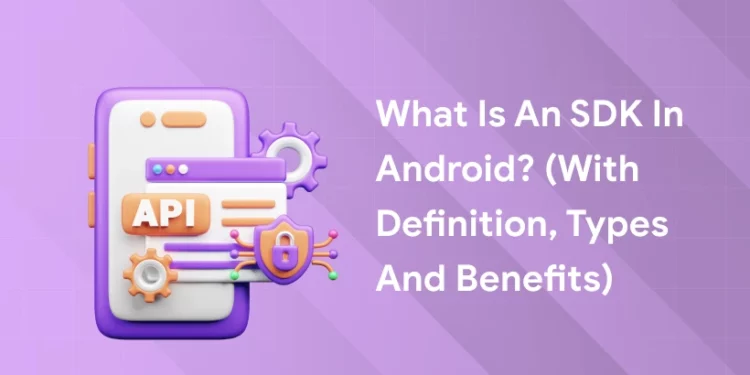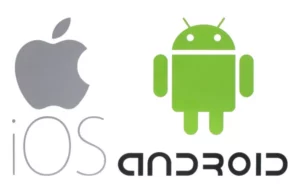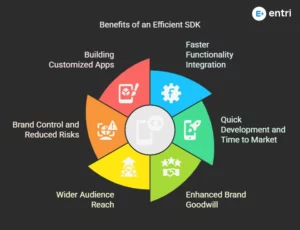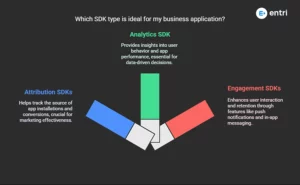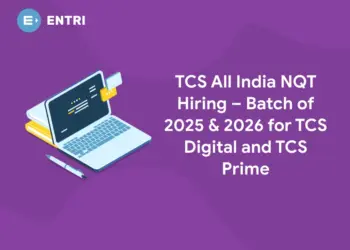Table of Contents
App developers play with the tools in hand to build a masterpiece. One such toolkit is Software Development Kit (SDK) that is used to build some high-end platform-specific applications. This blog talks about SDKs, their relevance, and their types available.
Check out this video by Entri in Malayalam!
Introduction: What is an SDK?
SDK development or Software Development Kit is an installable development toolkit that helps app developers create some masterpiece applications oriented to a specific OS platform. If a developer plans to build an iOS application he will use iOS SDK, similarly, for Android App development through JAVA coding needs Java Development Kits.
There are also VMware SDKs to build apps for VMware platforms, on any Windows OS. NET SDK framework and Nordic SDK for wireless smart-gadgets.
No matter what OS an app developer targets, a comprehensive SDK will include components like libraries, codes, plugins, documentation, development and runtime environments, drivers, compiler, testing analytics tools, and debugger. It is like assembling the right tools to develop a high-responsive and functioning application.
Thinking about developing an app? Create one with Entri’s Flutter training course!
How does an efficient SDK help your business mobile application?
No one will want to invest in an outdated application right? No matter it’s Android or iOS, and efficient SDK is a base for an advanced and robust application with no technical errors and bugs.
Here is how an efficient SDK benefits your business application:
1. Integrates Functionalities Faster
2. Quick Development and Less Time to Market
An app has quite a number of tools, and coding of every single tool is time and effort consuming. This is where the pre-coded and tested SDKs come to our rescue. For instance, a high-end Android application uses more than 15 publicly available SDKs.
Pre-coded SDKs reduce the time to develop, test, and debug the app as a result you are ready with a robust application to compete in a market within a lesser time.
If you are investing your money then your app development company will invest its time and resources and thus there are many functionalities in the app that are custom coded by highly experienced and certified app developers.
3. Enhances A Brand’s Goodwill
Successful SDKs if integrated into your mobile application will benefit your customers with a quick and personalized user-experience which will ultimately contribute to the goodwill of your brand/business. SDKs are highly responsive to the OS they are specifically designed for.
4. A Wider Audience Reach
There are around 2.87 million credible apps residing on the PlayStore and 1.96 apps on AppStore. It is quite evident that a high-end robust application selling a demanded product or service will definitely grow in terms of downloads and usage. Among such large traffic on app gateways, it is quite possible for an app to get faded if it is not an outstanding application with the latest tech.
5. Brand Control and Reduced Risks
If an app possesses a well-built SDK it is more likely to synchronize well with other third-party applications. For instance, your app needs action from Facebook or is integrated with FB it has to give a better user experience for your viewer to remain. Other than that, these SDKs are secured protecting your application from fraudulent activities.
6. Building Customized Apps
Every app has different goals, purposes, and target audience to serve, a robust Software Development Kit provides the base for customizing the application for personalized use. App developers can build tailor-made tools and functions to justifies the purpose and theme of your business.
Become an Android App Developer with Entri’s Flutter training course! Join Now!
The Ideal SDK for your mobile application
As said above, an efficient SDK is the base of a robust application as it guides the app developers well. This brings us to judge the worth of an SDK.
Refer this checklist to judge the efficiency of an SDK:
- Easily Accessible by the developers
- Scalable
- Possess absolute documentation explaining the working of each code with example codes.
- Is not a threat to the OS, CPU, is not battery draining and dataspace consuming.
- Synchronizes well with other SDKs.
- Should have small and large libraries
- Fully Functional
- Should have multiple APIs for advanced functioning and communication with other apps.
Difference between SDKs and APIs
API is a much smaller term in comparison to SDKs. Let’s differentiate between the two…
| SDKs | APIs |
| It is a larger framework including multiple APIs. | APIs do not accommodate SDKs. |
| SDKs help developers develop robust applications from scratch. | APIs are used for the functioning of the applications. |
| SDK is a complete pre-coded toolkit that supports the making of an app. | API is just an interface working under the parameters of the SDKs. |
| SDKs use APIs to communicate with other apps/software. | API is a commute between two applications/software. |
Master Android app development with Entri. Enrol now to elevate your career!
Which are the ideal SDKs for your business application?
As discussed above an app needs more than one SDK for functioning. But which SDKs are the best for your business application and how it will help you get the best out of your investment.
Let’s dig into the types of mobile app SDKs and how they contribute to your business application:
1. Attribution SDKs
“You might not want to shoot in the dark”.
There are various marketing strategies a business uses to promote its app, an attribution SDK helps them discover which marketing strategy works best for them and from which platform quality leads are generating. For instance, your users are converting more from ad campaigns then you might want to invest more in the ads.
-
Top 5 Attribution SDKs
Here are the popular attribution SDKs and their percentage of usage in AppStore and Google Play, according to appfigures.
-
-
AppStore
-
| Popular Attribution SDKs | Percentage of iOS Apps Using these SDKs |
| AppsFlyer | 43% |
| Branch Metrics | 25% |
| Adjust | 23% |
| AppMetrica | 11% |
| Adobe Mobile | 3% |
-
-
Google Play
-
| Popular Attribution SDKs | Percentage of Android Apps Using these SDKs |
| AppsFlyer | 45% |
| Adjust | 26% |
| Branch Metrics | 20% |
| App Metrica | 16% |
| MyTracker | 8% |
2. Analytics SDK
This tool is an asset for developers as this helps enhance the functioning of the app as per the customers’ actions. The tool is a go-to utility when it comes to analyzing user actions on the app and is fulfilling the goals and the sales targets of the business.
-
Top 5 Analytics SDKs
-
AppStore
-
| Popular Analytics SDKs | Percentage of iOS Apps Using these SDKs |
| FireBase | 87% |
| Fabric | 15% |
| Google Analytics | 14% |
| Facebook Analytics | 15% |
| Flurry Analytics | 3% |
-
-
Google Play
-
According to Statistica:
| Popular Analytics SDKs | Percentage of Android Apps Using these SDKs |
| Firebase | 99.47% |
| Firebase Analytics | 73.16% |
| React Native Firebase | 9.75% |
| Yandex AppMetrica | 2.65% |
| Mixpanel | 2.64% |
3. Engagement SDKs
Needless to say, every application needs user engagement and retention in order to flourish in the market, and here comes to limelight App’s Engagement SDKs. This app tool is mandatory for any mobile application to grow as it brings in more impressions to your application increasing the reach of your application.
-
Top 5 Engagement SDKs
According to appfigures:
-
-
AppStore
-
| Popular Engagement SDKs | Percentage of iOS Apps Using these SDKs |
| CleverTap | 20% |
| Airship | 20% |
| Braze | 19% |
| AWS Pinpoint | 19% |
| Leanplum | 5% |
-
-
Google Play
-
| Popular Engagement SDKs | Percentage of Android Apps Using these SDKs |
| WebEngage | 35% |
| Snowplow | 24% |
| MoEngage | 19% |
| CleverTap | 17% |
| Braze | 9% |
Conclusion
A business needs a fully-functioning app to compete well in the market, to increase its reach, and to establish its brand’s goodwill domestically and worldwide. Now that you are expecting this much from your application, it is crucial to plan a robust app for your purpose. Here comes the need for powerful and tested SDKs to implement and integrate into your app.
Want to know the basics of Android apps and app development? Enrol now at Entri’s Flutter training course with experts as mentors and practical hands-on approach. This is your gateway to kickstart your career in android app development and increase your knowledge and expertise in SDKs. Join now!
|
Related articles |
|
| Learning Android Development In 2025 | |
Frequently Asked Questions
What is an SDK in Android?
An SDK (Software Development Kit) in Android is a comprehensive set of tools, libraries, and documentation that developers use to build, test, and optimize Android applications. It includes essential components like APIs, emulators, and debugging tools to facilitate app development.
What are the key components of the Android SDK?
The Android SDK comprises several critical components:
-
SDK Tools: Utilities for building and debugging apps.
-
SDK Platform Tools: Tools essential for building and testing applications for different Android versions.
-
SDK Build Tools: Tools required for building Android applications.
-
Android Emulator: A virtual device that simulates various Android devices for testing purposes.
-
Android Support Libraries: Libraries that provide backward-compatible versions of Android features.
-
Google Play Services: APIs and services provided by Google to integrate apps with Google services such as Maps, Analytics, and Firebase.
-
Documentation and Sample Code: Comprehensive documentation and sample code snippets to assist developers in understanding and using the SDK effectively.
What are the different types of SDKs available for Android development?
Android development utilizes various SDKs to enhance app functionality:
-
Core SDK: The foundational SDK provided by Google for building Android applications.
-
Third-Party SDKs: SDKs from external providers that offer additional features like analytics, payment processing, and social media integration.
-
Custom SDKs: Proprietary SDKs developed by companies to integrate specific functionalities unique to their services or products.
How does the Android SDK support multiple programming languages?
The Android SDK supports multiple programming languages, primarily Java and Kotlin. Kotlin is now the preferred language for Android development, offering modern features and enhanced syntax. The SDK provides tools and libraries compatible with both languages, allowing developers to choose the one that best fits their project requirements.
Can I develop Android apps without using the Android SDK?
While it’s technically possible to develop Android applications without the official Android SDK, it is highly impractical. The SDK provides essential tools, libraries, and documentation that streamline the development process, ensuring compatibility with Android devices and adherence to best practices.


